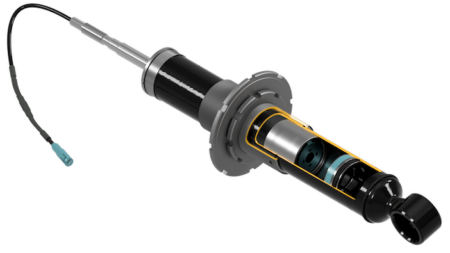Braking and chassis systems specialist, BWI Group, has developed a monotube damper that offers the benefits of both twin-tube and monotube dampers in one unit. According to BWI, the design combines the light weight and temperature stability of a typical mono-tube design with the wide compression damping range at low gas charge pressures that is a benefit of twintube dampers.
“The breakthrough in performance means vehicle manufacturers can achieve the ride comfort demanded by their customers while reducing suspension mass, to support overall reductions in vehicle weight, in the quest for lower CO2 emissions,” stated Marcin Knapczyk, engineering manager at BWI’s ride development department. “Our new dampers are up to 40% lighter than equivalent twin-tube products.”
According to the company, the technology does not increase manufacturing complexity compared with conventional mono-tube damper production, as only one additional component is required. The pressure tube contains a fixed-base valve assembly, a floating piston and a piston rod, which has its own piston valve assembly.
The piston and fixed-base compression valves work together simultaneously during the compression stroke in order to provide a wide tuning range, while in the rebound stroke, the damper performance is defined only by the piston rebound valve, as in a conventional mono-tube damper.
“Our unique arrangement enables low gas pressures to be used, giving better isolation from road shocks, while maintaining stable damping forces over a wide temperature range,” added Knapczyk “The damper remains fully functional in any orientation – inclined, horizontal or even inverted – and separation of the oil and gas chambers by a floating piston ensures superior fade resistance. The unit also provides exceptional energy dissipation.”
The dampers are aimed at vehicles in market segments such as electric cars where mass reduction is a key aim.




